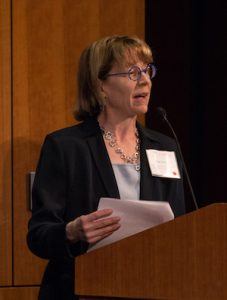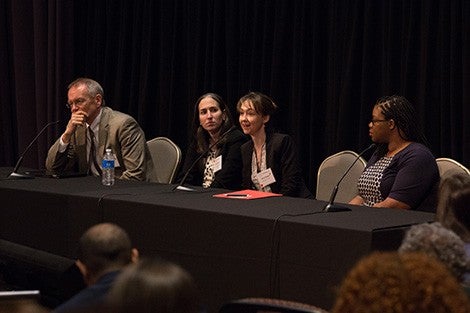May 4, 2018 – Fashion ads featuring stick-thin models, weight limits for athletic participation, the promotion of diet pills and cosmetic surgery, giant portion sizes at restaurants—these are just a few of the factors that contribute to eating disorders.
An April 30, 2018 symposium convened by STRIPED (Strategic Training Initiative for the Prevention of Eating Disorders) in collaboration with Harvard Catalyst brought together researchers, advocates, policy makers, and thought leaders to identify research gaps in the field and to spark new partnerships to advance the prevention of disorders such as anorexia, bulimia, binge eating, and fasting.

Thirty million Americans will develop an eating disorder in their lifetime and many tens of millions more will have a so-called subclinical eating disorder that can be just as debilitating and sometimes deadly, according to S. Bryn Austin, director of STRIPED and professor in the Department of Social and Behavioral Sciences at Harvard T.H. Chan School of Public Health. She noted that eating disorders have among the highest mortality rate of any psychiatric disorder in the country.
“This is no time for business-as-usual incremental science,” she said. “We need great leaps in our progress toward prevention, and we can’t achieve that if we stay in the comfort zones of our disciplinary or sectoral silos.”
About 230 people attended the daylong symposium at the Joseph B. Martin Conference Center, which featured presentations from 28 experts. Topics ranged from examining the effects of weight stigma on marginalized populations to determining the cost effectiveness of particular prevention strategies. The symposium also featured an afternoon hack-a-thon at which participants worked in teams to brainstorm new research ideas.
Christina Roberto, assistant professor of medical ethics and health policy at the University of Pennsylvania’s Perelman School of Medicine and an alumna of the Harvard RWJF Health & Society Scholar program, called for more “strategic science”—science aimed at changing policy—to combat the problem of eating disorders. “We need to really get researchers engaged with policy makers,” she told the audience.
Keynote speaker was Sarah Sliwa, a health scientist from the U.S. Centers for Disease Control and Prevention (CDC), who described the agency’s blueprint for integrating health-promoting practices in schools.
photos: Sarah Sholes
